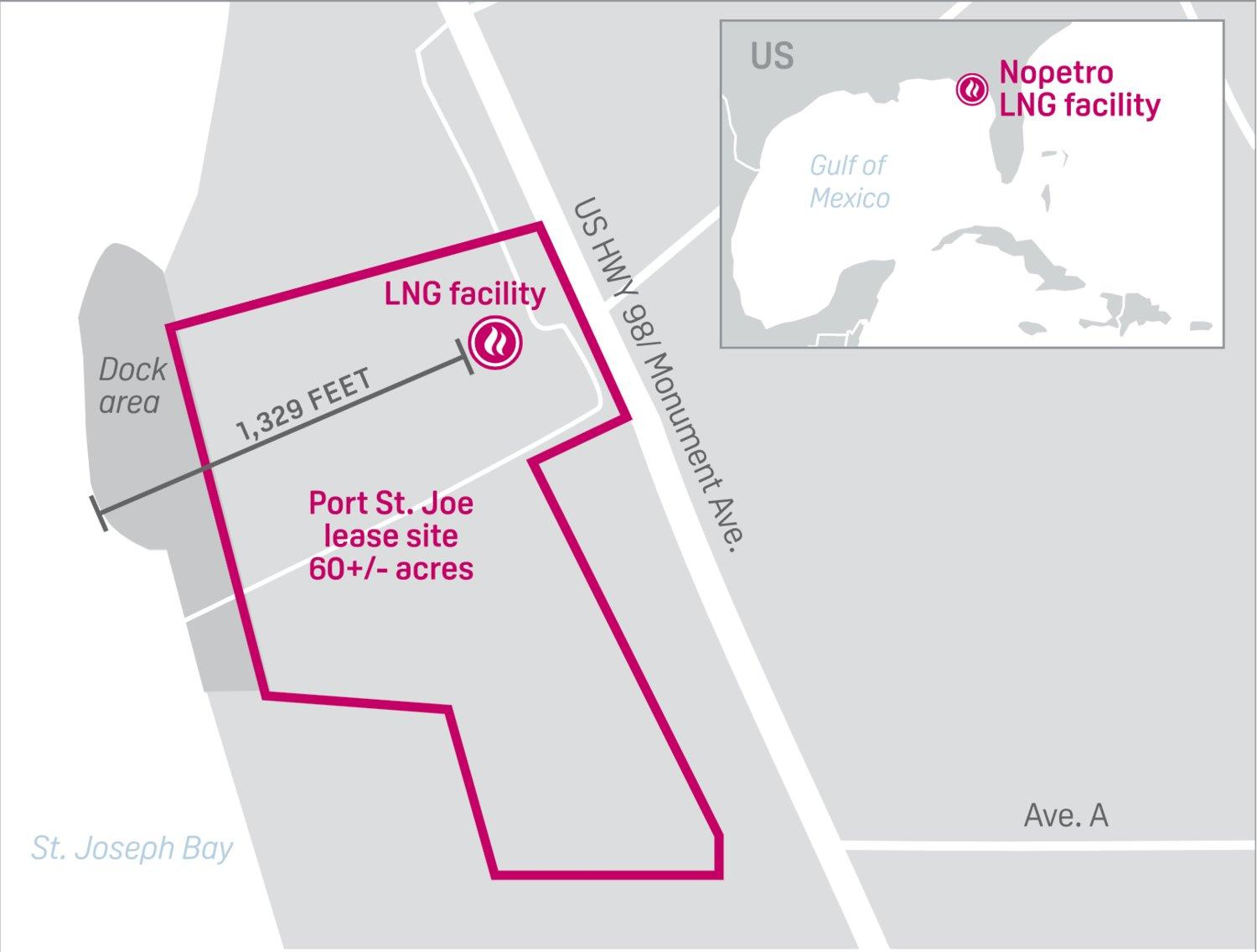FERC defends refusal to regulate proposed Nopetro LNG facility
Six months after consumer advocacy organization Public Citizen, along with several local residents, filed a lawsuit seeking to ensure federal oversight over a proposed LNG project in Port St. Joe, the Federal Energy Regulatory Commission has filed their response in the case, defending their refusal to assert jurisdiction over the facility.
In a brief filed March 20, FERC urges the D.C. Circuit Court to affirm the commission’s March 2022 finding that the facility does not qualify as a liquefied natural gas terminal under the Natural Gas Act.
FERC based this determination on the project’s unique design.
If constructed by Miami-based Nopetro LNG LLC on the site of the former St. Joe Paper Company Paper Mill, the facility would liquefy and process natural gas before transporting it 1,329 feet to ships waiting on the coast. According to FERC, this disqualifies the facility from being an “LNG terminal” as defined by their precedent. Therefore, they assert that the project is exempt from their jurisdiction.
“In assessing whether a facility handling liquefied natural gas intended for export is a FERC-jurisdictional ‘LNG terminal,’ the Commission has historically considered, among other things, the location of the facility in relation to the vessels that will export the product. If the facility is capable of transferring LNG directly onto waterborne vessels, the Commission has deemed the facility an “LNG terminal” within the meaning of the Natural Gas Act (assuming other requirements are met). Conversely, a facility that relies on another mode of transportation — like trucks — to get the gas to the point of export will not be deemed a FERC-jurisdictional ‘LNG terminal,’” reads the commission’s brief.
“Here, Nopetro’s facility is not located at the coastline. LNG processed at this facility must be transported by truck to the port, where it would then be loaded onto general-use cargo ships.”
Public Citizen, which is based in Washington D.C., is now challenging this definition for the second time, after having appealed FERC’s initial decision, which was upheld again in July of 2022.
“FERC’s entire flawed argument that this quarter mile gap between the liquefaction trains and the dock renders this facility not at the shoreline is just absurd,” said Tyson Slocum, Public Citizen’s energy program director, who has been working alongside local organizations to push back against FERC’s ruling.
U.S. statute gives FERC exclusive authority to define which facilities meet the criteria for their jurisdiction. However, Public Citizen argues that the commission’s definition in this case represents a lack of knowledge of the local community and geography.
“Anyone who crosses (the Highland View) Bridge or walks out to the edges of this lot — you’re looking directly out onto the bay. If you built a house there, you would tell your real estate agent to advertise it as on the coastline.”
Slocum and Public Citizen argue that federal regulatory practices offer a fairly large deal of transparency, which he said many residents feel is lacking, as well as extensive environmental assessment and review.
According to Slocum, Public Citizen plans to file a response to FERC’s brief before the end of the month.
The proposed facility has stirred up tensions within Gulf County since last summer, when it became the topic of frequent local discussion.
Since, the project has garnered a large amount of local opposition, with more than 260 locals signing a petition opposing the LNG facility’s construction.
But beyond Public Citizen’s lawsuit, discussions within the community have called into question whether locals consider an industrial facility of this type to be in accord with the future they envision for Port St. Joe.
At three of the last four Port St. Joe Board of City Commissioners meetings, residents have taken to the podium to express their desire to see the future of development in the area transition away from heavy industrial practices.
But proponents of the project have argued that Nopetro’s facility presents an opportunity to strengthen the local economy, bringing jobs and tax base.
“Think about a three legged stool,” State Representative Jason Shoaf said during Gulf County’s January Legislative Delegation Hearing. “You’ve got one leg, which is tourism. … Then you add a second leg. We’ve got Tyndall Air Force Base and the government. That’s a second leg that is secure. It’s not going anywhere. But we need a third leg, folks, you got to have some industry, you got to have some private jobs. Otherwise, the stool is unstable.”
Shoaf, whose family owns the natural gas company that would supply the proposed Nopetro plant, wrote a letter of support for the project to be exempt from FERC jurisdiction in 2021, along with U.S. Representative Neal Dunn.
These sentiments have been echoed by county officials, and the board of county commissioners sent a letter of support to the St. Joe Company encouraging the entity to continue pursuing projects of this nature and inviting Nopetro to share more about their plans.
At this point in time, there is no guarantee Nopetro will move forward with applying for permits to build in this area.
Among the project’s next steps would be applying for a development order from the city. Port St. Joe City Manager Jim Anderson, previously said that the company indicated to the city it was possible they would apply for a development order by the second or third quarter of this year, but not beforehand.
After this, public hearings on the project would be required, and the city could either approve or deny Nopetro’s request.
In Washington D.C., the lawsuit between Public Citizen and FERC is not likely to see a courtroom before this Fall, according to Slocum.

